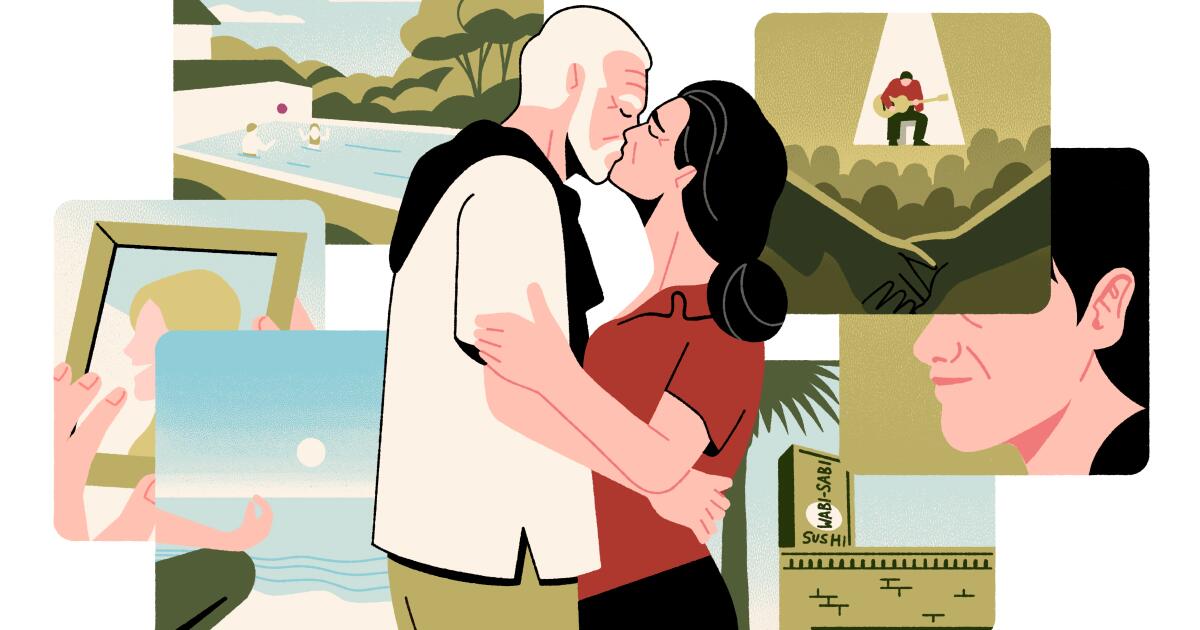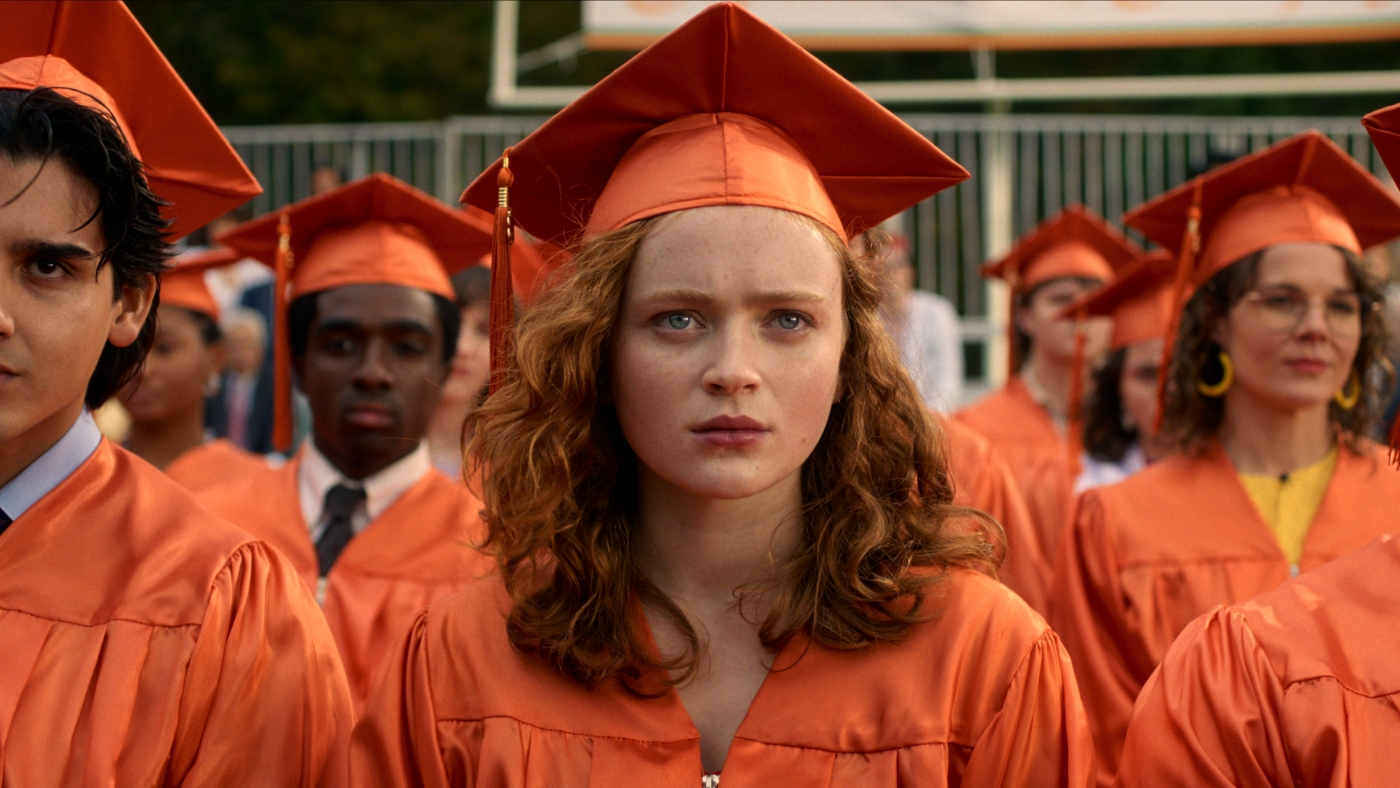Lifestyle
L.A. Affairs: After my wife of 32 years died, I was lost. Could I ever love again?

It was my senior year at Van Nuys High. I had noticed her, especially because two of my buddies were drooling over her best friend who cruised the quad of the San Fernando Valley high school with the air of a temptress. Head over heels, my friends did everything they could to lurk in close proximity to her, and I tagged along.
One Friday afternoon, Mike, Larry and I were driving together to Ensenada to surf away the weekend. We took a right off Ventura Boulevard onto Sepulveda Boulevard. By a stroke of luck, we spotted yet passed by their source of attraction walking in the direction of the hills with two girlfriends. A crazy, screeching U-turn later, we were all chatting, and the girls invited us up to my future wife’s house and pool.
We acquiesced and drove up Woodcliff Road, forgetting all about picking up another Mike at his parents’ garage for our trip. Poolside, I ended up staring into the dark brown eyes of my future wife accompanied by her bleach-blond friend, while my friends tried their best to act cool next to the girl they had lusted after for much of the past school semester.
I had an epiphany, realizing she was the most gorgeously attractive girl my 17-year-old self had ever encountered. I wanted to skip the Mexico trip but couldn’t convince the others. So, hours later, we eventually took off to pick up the other Mike. All weekend I dreamed of Monday when I would see her again in school.
The girl with dark brown eyes and I eventually got married — a marriage that lasted 32 years and three kids but ended when she died from breast cancer in 2012.
Confused years ensued. I was devastated yet found first-class therapy from yoga and ocean time. Eventually I started dating — month-long liaisons as well as some for a year or so. My dating go-to spots mostly lined the Venice stretch along Abbot Kinney Boulevard, especially Wabi-Sabi or the Tasting Kitchen. But my heart was truly never looking for short-term hookups. It desired another chance at 30 years with deep, magical, encompassing love. Friends told me I was being unrealistic. I said it was complicated.
I had long refused to be set up, gently turning down any attempts by friends and family to arrange dates or promptings to meet this or that woman. Also, the idea of a dating app was not in the picture. No dis, but I was fortunate enough to meet women in other ways. Then again, nothing stuck. Not until the day when a woman from an infatuation a few years back introduced me to Michele.
For some unknown reason, I happily agreed to her get-together. Maybe it was my state of mind at the time. I can’t explain it. Also, it wasn’t even a date. Or so I told myself. A dinner for three, without even having seen what Michele looked like. All I knew was that my ex cryptically said she was “Filipino or something … Asian anyway,” without me inquiring.
I was early, so I parked outside the restaurant, which was close to the place Michele managed. On the spur of the moment, I walked down to the small shop, peeked in and saw a woman who matched the description. Still, I decided to wait outside until the customers had left, when she would be alone since she was about to close. I even had time to walk back to my car and change from my T-shirt into a clean white dress shirt I had brought with me.
I walked in smiling, introduced myself and asked if she was Michele. I realize it was a bit of an unusual move to just barge in, but, seemingly unfazed, she smiled back. There was this immediate organic connection. We spoke for at least 15 minutes, and the conversation flowed as if we had known each other for decades.
At the restaurant, we talked about everything. Past and present. My ex moved over to talk to some friends as Michele and I carved a path in each other’s eyes, getting down to personal emotions right away as if it was the most natural thing in the world. I’ve never been able to be any other way, and her heart, she later revealed, seemed to blossom in a way her almost 60-year-old well-traveled soul had never experienced.
Michele kissed me as we parted. (She still says I kissed her.) Four days later, we went on our first real date. All this was right before Christmas, and soon after, I was taking a trip to Sweden. I had known her only a week, but as she drove me to the airport, I asked her to join me for a Jason Isbell concert at Walt Disney Concert Hall two weeks later. She said yes.
Once reunited, I gave her a book of mine with the inscription: “You’ve tattooed your name on my heart” … and here we are five years later and married. Her Taiwanese heritage and my Swedish background have cemented a foundation that grows and flourishes beyond all barriers, cherishing what SoCal and the world have to offer.
All relationships encounter challenges. Michele emphatically maintains they make you stronger. Adjust, gain insight and integrity, yet embrace loving compromise. That’s progress. Love transcends it all if you work on it.
The author is a writer who has shuttled among Maui, Sherman Oaks and Stockholm while producing radio and television in collaboration with the BBC. Today his company publishes a current events quiz for schools.
L.A. Affairs chronicles the search for romantic love in all its glorious expressions in the L.A. area, and we want to hear your true story. We pay $400 for a published essay. Email LAAffairs@latimes.com. You can find submission guidelines here. You can find past columns here.

Lifestyle
Sunday Puzzle: New newsmakers of 2025

On-air challenge
Every year around this time I present a “new names in the news” quiz. I’m going to give you some names that you’d probably never heard before 2025 but that were prominent in the news during the past 12 months. You tell me who or what they are.
1. Zohran Mamdani
2. Karoline Leavitt
3. Mark Carney
4. Robert Francis Prevost (hint: Chicago)
5. Jeffrey Goldberg (hint: The Atlantic)
6. Sanae Takaichi
7. Nameless raccoon, Hanover County, Virginia
Last week’s challenge
Last week’s challenge came from Joseph Young, of St. Cloud, Minn. Think of a two-syllable word in four letters. Add two letters in front and one letter behind to make a one-syllable word in seven letters. What words are these?
Challenge answer
Ague –> Plagued / Plagues / Leagues
Winner
Calvin Siemer of Henderson, Nev.
This week’s challenge
This week’s challenge is a numerical one from Ed Pegg Jr., who runs the website mathpuzzle.com. Take the nine digits — 1, 2, 3, 4, 5, 6, 7, 8, 9. You can group some of them and add arithmetic operations to get 2011 like this: 1 + 23 ÷ 4 x 5 x 67 – 8 + 9. If you do these operations in order from left to right, you get 2011. Well, 2011 was 15 years ago. Can you group some of the digits and add arithmetic symbols in a different way to make 2026? The digits from 1 to 9 need to stay in that order. I know of two different solutions, but you need to find only one of them.
If you know the answer to the challenge, submit it below by Thursday, January 8 at 3 p.m. ET. Listeners whose answers are selected win a chance to play the on-air puzzle.
Lifestyle
Daniel Tosh Sells Lake Tahoe Estate for $10.75 Million

Daniel Tosh
Sells Lake Tahoe Home for Millions
Published
Daniel Tosh has officially sold his sprawling Lake Tahoe compound but the comedian isn’t leaving the area … TMZ has learned.
Real estate sources tell us the 7-bedroom, 7-bath estate officially closed Friday for $10.75 million, and Tosh bought another property across the lake to be closer to friends, which is why he decided to sell.
The gated estate, located on the pristine west shore between Tahoe City and Sunnyside, sprawls across 1.6 acres and features three distinct homes, each with its own character and charm.
The Upper House is the ultimate entertainer’s dream … 4 bedrooms, 3 baths, elevator, game room, industrial ice cream maker, 4-car garage, hot tub, fire pit, bocce and horseshoe pits, and sprawling lawns with breathtaking lake views.
The Middle House keeps classic Tahoe charm alive with knotty pine interiors, 3 bedrooms, 3 baths, a stone fireplace, skylit kitchen, and steam shower — perfect for unwinding after a day on the lake.
The lakeside cabin is a serene retreat with a studio loft, retro kitchenette, modern bathroom, and French doors opening right onto the lake.
Altogether, the property boasts 93 feet of lake frontage, two buoys, and multiple outdoor spaces for fun and relaxation.
Daniel may be moving, but one thing’s clear … he’s still very much a Lake Tahoe guy, just on the other side of the lake now.
Lifestyle
What worked — and what didn’t — in the ‘Stranger Things’ finale

Sadie Sink as Max Mayfield.
Netflix
hide caption
toggle caption
Netflix
Yes, there are spoilers ahead for the final episode of Stranger Things.
On New Year’s Eve, the very popular Netflix show Stranger Things came to an end after five seasons and almost 10 years. With actors who started as tweens now in their 20s, it was probably inevitable that the tale of a bunch of kids who fought monsters would wind down. In the two-plus-hour finale, there was a lot of preparation, then there was a final battle, and then there was a roughly 40-minute epilogue catching up with our heroes 18 months later. And how well did it all work? Let’s talk about it.
Worked: The final battle
The strongest part of the finale was the battle itself, set in the Abyss, in which the crew battled Vecna, who was inside the Mind Flayer, which is, roughly speaking, a giant spider. This meant that inside, Eleven could go one-on-one with Vecna (also known as Henry, or One, or Mr. Whatsit) while outside, her friends used their flamethrowers and guns and flares and slingshots and whatnot to take down the Mind Flayer. (You could tell that Nancy was going to be the badass of the fight as soon as you saw not only her big gun, but also her hair, which strongly evoked Ripley in the Alien movies.) And of course, Joyce took off Vecna’s head with an axe while everybody remembered all the people Vecna has killed who they cared about. Pretty good fight!
Did not work: Too much talking before the fight
As the group prepared to fight Vecna, we watched one scene where the music swelled as Hopper poured out his feelings to Eleven about how she deserved to live and shouldn’t sacrifice herself. Roughly 15 minutes later, the music swelled for a very similarly blocked and shot scene in which Eleven poured out her feelings to Hopper about why she wanted to sacrifice herself. Generally, two monologues are less interesting than a conversation would be. Elsewhere, Jonathan and Steve had a talk that didn’t add much, and Will and Mike had a talk that didn’t add much (after Will’s coming-out scene in the previous episode), both while preparing to fight a giant monster. It’s not that there’s a right or wrong length for a finale like this, but telling us things we already know tends to slow down the action for no reason. Not every dynamic needed a button on it.
Worked: Dungeons & Dragons bringing the group together
It was perhaps inevitable that we would end with a game of D&D, just as we began. But now, these kids are feeling the distance between who they are now and who they were when they used to play together. The fact that they still enjoy each other’s company so much, even when there are no world-shattering stakes, is what makes them seem the most at peace, more than a celebratory graduation. And passing the game off to Holly and her friends, including the now-included Derek, was a very nice touch.

Charlie Heaton as Jonathan Byers, Natalia Dyer as Nancy Wheeler, Maya Hawke as Robin Buckley, and Joe Keery as Steve Harrington.
Netflix
hide caption
toggle caption
Netflix
Did not work: Dr. Kay, played by Linda Hamilton
It seemed very exciting that Stranger Things was going to have Linda Hamilton, actual ’80s action icon, on hand this season playing Dr. Kay, the evil military scientist who wanted to capture and kill Eleven at any cost. But she got very little to do, and the resolution to her story was baffling. After the final battle, after the Upside Down is destroyed, she believes Eleven to be dead. But … then what happened? She let them all call taxis home, including Hopper, who killed a whole bunch of soldiers? Including all the kids who now know all about her and everything she did? All the kids who ventured into the Abyss are going to be left alone? Perfect logic is certainly not anybody’s expectation, but when you end a sequence with your entire group of heroes at the mercy of a band of violent goons, it would be nice to say something about how they ended up not at the mercy of said goons.


Worked: Needle drops
Listen, it’s not easy to get one Prince song for your show, let alone two: “Purple Rain” and “When Doves Cry.” When the Duffer Brothers say they needed something epic, and these songs feel epic, they are not wrong. There continues to be a heft to the Purple Rain album that helps to lend some heft to a story like this, particularly given the period setting. “Landslide” was a little cheesy as the lead-in to the epilogue, but … the epilogue was honestly pretty cheesy, so perhaps that’s appropriate.
Did not work: The non-ending
As to whether Eleven really died or is really just backpacking in a foreign country where no one can find her, the Duffer Brothers, who created the show, have been very clear that the ending is left up to you. You can think she’s dead, or you can think she’s alive; they have intentionally not given the answer. It’s possible to write ambiguous endings that work really well, but this one felt like a cop-out, an attempt to have it both ways. There’s also a real danger in expanding characters’ supernatural powers to the point where they can make anything seem like anything, so maybe much of what you saw never happened. After all, if you don’t know that did happen, how much else might not have happened?
This piece also appears in NPR’s Pop Culture Happy Hour newsletter. Sign up for the newsletter so you don’t miss the next one, plus get weekly recommendations about what’s making us happy.
Listen to Pop Culture Happy Hour on Apple Podcasts and Spotify.
-

 Entertainment1 week ago
Entertainment1 week agoHow the Grinch went from a Yuletide bit player to a Christmas A-lister
-

 World7 days ago
World7 days agoHamas builds new terror regime in Gaza, recruiting teens amid problematic election
-

 Indianapolis, IN1 week ago
Indianapolis, IN1 week agoIndianapolis Colts playoffs: Updated elimination scenario, AFC standings, playoff picture for Week 17
-

 Southeast1 week ago
Southeast1 week agoTwo attorneys vanish during Florida fishing trip as ‘heartbroken’ wife pleads for help finding them
-

 Business1 week ago
Business1 week agoGoogle is at last letting users swap out embarrassing Gmail addresses without losing their data
-

 World1 week ago
World1 week agoBest of 2025: Top five defining moments in the European Parliament
-

 World1 week ago
World1 week agoSnoop Dogg, Lainey Wilson, Huntr/x and Andrea Bocelli Deliver Christmas-Themed Halftime Show for Netflix’s NFL Lions-Vikings Telecast
-

 News1 week ago
News1 week agoDOJ says it may need a ‘few more weeks’ to finish releasing Epstein files



















